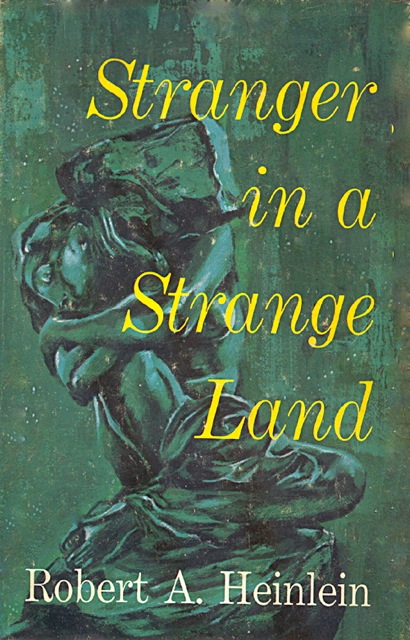Hardcover, 408 pages
English language
Published June 1961 by G.P. Putnam's Sons.

Hardcover, 408 pages
English language
Published June 1961 by G.P. Putnam's Sons.
Not since the publication of Philip Wyhe's Generation of Vipers has there been a book quite so deliberately designed to make us uncomfortable about nearly everything we take for granted. In this entertaining and often shocking novel, however, Mr. Heinlein uses fictional characters in fictional situations to attack all explanations of the universe offered on faith, to undermine the idea of sexual relations founded on jealousy, and to annoy the materialists and the politicians.
Although certain of the techniques of science fiction are used, STRANGER IN A STRANGE LAND might be classed as philosophical fantasy, or as an entertainment, or, perhaps, as Cabellesque satire. A completely freewheeling look at contemporary culture from the nonhuman viewpoint of someone from another culture, it is unlike anything that has ever been done before. It is deliberately annoying, and often very funny. It runs down the sacred cows and slaughters them hilariously.
Here is …
Not since the publication of Philip Wyhe's Generation of Vipers has there been a book quite so deliberately designed to make us uncomfortable about nearly everything we take for granted. In this entertaining and often shocking novel, however, Mr. Heinlein uses fictional characters in fictional situations to attack all explanations of the universe offered on faith, to undermine the idea of sexual relations founded on jealousy, and to annoy the materialists and the politicians.
Although certain of the techniques of science fiction are used, STRANGER IN A STRANGE LAND might be classed as philosophical fantasy, or as an entertainment, or, perhaps, as Cabellesque satire. A completely freewheeling look at contemporary culture from the nonhuman viewpoint of someone from another culture, it is unlike anything that has ever been done before. It is deliberately annoying, and often very funny. It runs down the sacred cows and slaughters them hilariously.
Here is an incredible story with enough excitement and action for five novels, but it is not for people who are easily shocked. Although he knew it was an impossible objective, Mr. Heinlein's purpose in writing this novel was to examine every major axiom of Western culture, to question each axiom, throw doubt on it—and, if possible —to make the antithesis of each axiom appear a possible and perhaps desirable thing—rather than unthinkable.
